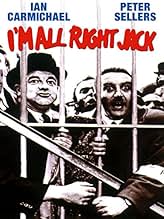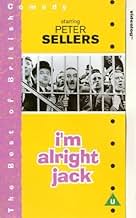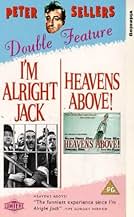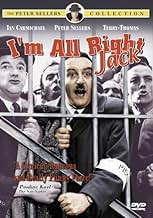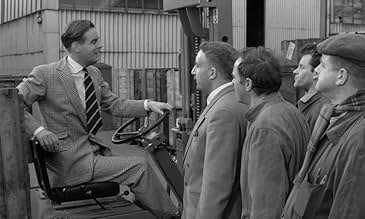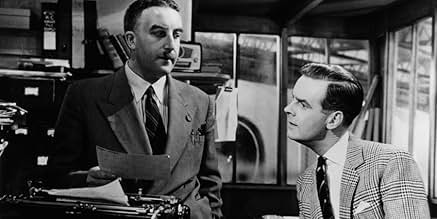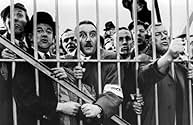NOTE IMDb
7,1/10
4,6 k
MA NOTE
Ajouter une intrigue dans votre langueA naive, dimwitted young man of aristocratic background in search of a career becomes caught up in the struggles between his profit-minded uncle and an aggressive labor union.A naive, dimwitted young man of aristocratic background in search of a career becomes caught up in the struggles between his profit-minded uncle and an aggressive labor union.A naive, dimwitted young man of aristocratic background in search of a career becomes caught up in the struggles between his profit-minded uncle and an aggressive labor union.
- Réalisation
- Scénario
- Casting principal
- Victoire aux 2 BAFTA Awards
- 3 victoires et 1 nomination au total
Dennis Price
- Bertram Tracepurcel
- (as Denis Price)
Avis à la une
I'm All Right Jack is directed and produced by John and Roy Boulting from a script by Frank Harvey, John Boulting and Alan Hackney. It's based on the novel Private Life by Hackney and is a sequel to the Boulting's 1956 film Private's Progress. Returning from the first film are Ian Carmichael, Dennis Price, Richard Attenborough, Terry-Thomas, Victor Madden & Miles Malleson. While Peter Sellers (BAFTA for Best Actor) and a ream of British comedy actors of the time make up the rest of the cast.
Looking to force a crooked deal, Bertram Tracepurcel (Price) and his cohort Sydney de Vere Cox (Attenborough) convince Major Hitchcock (Thomas), the personnel manager at the local missile factory, to hire Tracepurcel's nephew, Stanley Windrush (Carmichael), knowing full well that his earnest and wet behind the ears approach to work will cause fractions within the work force. Then it's expected that Bolshoi shop steward Fred Kite (Sellers) will call a strike that will see the crooked plan to fruition.
Between 1956 and 1963 the Boulting brothers produced a number of satirical movies, I'm All Right Jack is arguably the finest of the bunch. Given that it's now admittedly a dated time capsule, for some of the dialogue would simply be shot down in this day and age, one has to judge and value it for the time it was made. The first and most striking thing about the film is that nobody escapes the firing line, this is not merely a device to kick the trade unions with {and a kicking they do get}, but also the government, the media, big industries and the good old chestnut of the old school brigade. All are in the sights of the Boulting's and the team. The overriding message being that all of them are out for themselves, self-interest and feathering of ones nest is the order of the times.
Also winning a BAFTA was the screenplay, with that you still need the cast to do do it justice. Ian Carmichael was an undervalued performer in that he was an unselfish actor feeding set ups to his costars. That is never more evident than it is here where the likes of Margaret Rutherford, Irene Handl, John Le Mesurier, Liz Fraser & Victor Madden benefit greatly playing off of Carmichael's toff twit twittering. But it's Sellers movie all the way. Which considering he didn't want to do the movie originally, saying he couldn't see the role of Kite being funny, makes his turn all the more special. Studying for weeks labour leaders and politico types, Sellers, with suit too tight, cropped hair and a Hitler moustache, nails the pompous militancy of the shop steward leader. It doesn't stop there, couple it with the contrast of Kite's home life, where the Boulting's are slyly digging away at facades, and you get a two side of the coin performance that's a joy from start to finish.
Very much like Ealing's sharp 51 piece, The Man In The White Suit, this is cynical, but classy, British cinema across the board. Throwing punches and with cheek unbound, I'm All Right Jack has razor sharp teeth from which to take a bite of the comedy pie with. 9/10
Looking to force a crooked deal, Bertram Tracepurcel (Price) and his cohort Sydney de Vere Cox (Attenborough) convince Major Hitchcock (Thomas), the personnel manager at the local missile factory, to hire Tracepurcel's nephew, Stanley Windrush (Carmichael), knowing full well that his earnest and wet behind the ears approach to work will cause fractions within the work force. Then it's expected that Bolshoi shop steward Fred Kite (Sellers) will call a strike that will see the crooked plan to fruition.
Between 1956 and 1963 the Boulting brothers produced a number of satirical movies, I'm All Right Jack is arguably the finest of the bunch. Given that it's now admittedly a dated time capsule, for some of the dialogue would simply be shot down in this day and age, one has to judge and value it for the time it was made. The first and most striking thing about the film is that nobody escapes the firing line, this is not merely a device to kick the trade unions with {and a kicking they do get}, but also the government, the media, big industries and the good old chestnut of the old school brigade. All are in the sights of the Boulting's and the team. The overriding message being that all of them are out for themselves, self-interest and feathering of ones nest is the order of the times.
Also winning a BAFTA was the screenplay, with that you still need the cast to do do it justice. Ian Carmichael was an undervalued performer in that he was an unselfish actor feeding set ups to his costars. That is never more evident than it is here where the likes of Margaret Rutherford, Irene Handl, John Le Mesurier, Liz Fraser & Victor Madden benefit greatly playing off of Carmichael's toff twit twittering. But it's Sellers movie all the way. Which considering he didn't want to do the movie originally, saying he couldn't see the role of Kite being funny, makes his turn all the more special. Studying for weeks labour leaders and politico types, Sellers, with suit too tight, cropped hair and a Hitler moustache, nails the pompous militancy of the shop steward leader. It doesn't stop there, couple it with the contrast of Kite's home life, where the Boulting's are slyly digging away at facades, and you get a two side of the coin performance that's a joy from start to finish.
Very much like Ealing's sharp 51 piece, The Man In The White Suit, this is cynical, but classy, British cinema across the board. Throwing punches and with cheek unbound, I'm All Right Jack has razor sharp teeth from which to take a bite of the comedy pie with. 9/10
After the second world war is over, a new spirit of togetherness is fostered in the UK, and industry blossoms. Eager to get involved, the well-to-do Stanley Windrush tries to get a management job but fails. However some friends of the family, head of industry types get him a job with the workers at a missile factory. However his enthusiasm gets him in trouble with the all-powerful unions but is that what the bosses planned for all along?
First of all I cannot believe that this film has so few votes and comments (at time of writing this it's 270 and 5 respectively). I know this doesn't correlate with the number of users who have seen the film but it is a fair representation! I find that shocking, as this is one of the stronger satires I've seen for a good long while. The plot is a sort of comedy ploy by the bosses to shift work around to other firms (by relying on their own firm striking) and get personally rich as a result, however it is the satirical edge that makes it worth watching. Both bosses and unions get it in the neck here neither coming off well in the wash!
Bosses are seen as profit driven and not looking at the greater good, workers on the other hand are seen as looking after themselves while the unions cause more problems than they solve! There is an element of truth in all this that's why it is funny although it is obviously laid on a bit strong in the name of comedy. As a current worker in the UK manufacturing industry (yes, there is some left although it's an American company!) I am greatly amused by the caricatures as some elements (happily less each year) of them can still be seen in my place of employment! The management get off quite light as they are actually, at core, trying to improve the business's efficiency and thus compete with foreign firms. The workers and the unions get the hardest stick which is a little unfair after all the workers make the least and are the ones at risk, while the unions have brought about great steps in workers rights. For example it was funny for me to see FLT's moving around in heavily pedestrianised areas nowadays many larger factories will be totally segregated between vehicles and workers.
The plot does manage to mix the swipes so that it seems fair on the surface it is a pretty damning dig at British industry and, from modern views, it is quite prophetic as British industry has really fallen in the past few decades. The `one out, all out' strike mentality is well spoofed here but there's no doubting the damage that it (with other factors) has had. The only downside of the film looking back, is the racist views and racist language that is used at a couple of moments but in fairness these are not THAT offensive and can be overlooked as the culture of the film at the time.
Despite the quite anti-union feel to the film, Sellers does well to not overplay his character. The socialist worker type is really easy to get laughs off but Sellers brings out character and doesn't just go for an out and out mockery of the character. Carmichael is OK in the lead but is overshadowed by the sheer depth of excellent support roles. Le Mesurier's excellent, twitchy efficiency expert, Thomas' manager sweating and terrified of the workers he calls `an absolute shower' in the way only he can say it! Further faces fall into the film in the distinguished shapes of Attenborough, Rutherford and Price to name a few.
Overall this film comes out as a very classy satire. It hits the nail on the head and, over 40 years later, much of it can still be seen today and the damage from the stuff it satirises is being felt. The film is funny if you have a passing understanding of British industry in terms of politics, workers rights and unions even without this understanding the central plot is broad enough and funny enough to be worth seeing!
First of all I cannot believe that this film has so few votes and comments (at time of writing this it's 270 and 5 respectively). I know this doesn't correlate with the number of users who have seen the film but it is a fair representation! I find that shocking, as this is one of the stronger satires I've seen for a good long while. The plot is a sort of comedy ploy by the bosses to shift work around to other firms (by relying on their own firm striking) and get personally rich as a result, however it is the satirical edge that makes it worth watching. Both bosses and unions get it in the neck here neither coming off well in the wash!
Bosses are seen as profit driven and not looking at the greater good, workers on the other hand are seen as looking after themselves while the unions cause more problems than they solve! There is an element of truth in all this that's why it is funny although it is obviously laid on a bit strong in the name of comedy. As a current worker in the UK manufacturing industry (yes, there is some left although it's an American company!) I am greatly amused by the caricatures as some elements (happily less each year) of them can still be seen in my place of employment! The management get off quite light as they are actually, at core, trying to improve the business's efficiency and thus compete with foreign firms. The workers and the unions get the hardest stick which is a little unfair after all the workers make the least and are the ones at risk, while the unions have brought about great steps in workers rights. For example it was funny for me to see FLT's moving around in heavily pedestrianised areas nowadays many larger factories will be totally segregated between vehicles and workers.
The plot does manage to mix the swipes so that it seems fair on the surface it is a pretty damning dig at British industry and, from modern views, it is quite prophetic as British industry has really fallen in the past few decades. The `one out, all out' strike mentality is well spoofed here but there's no doubting the damage that it (with other factors) has had. The only downside of the film looking back, is the racist views and racist language that is used at a couple of moments but in fairness these are not THAT offensive and can be overlooked as the culture of the film at the time.
Despite the quite anti-union feel to the film, Sellers does well to not overplay his character. The socialist worker type is really easy to get laughs off but Sellers brings out character and doesn't just go for an out and out mockery of the character. Carmichael is OK in the lead but is overshadowed by the sheer depth of excellent support roles. Le Mesurier's excellent, twitchy efficiency expert, Thomas' manager sweating and terrified of the workers he calls `an absolute shower' in the way only he can say it! Further faces fall into the film in the distinguished shapes of Attenborough, Rutherford and Price to name a few.
Overall this film comes out as a very classy satire. It hits the nail on the head and, over 40 years later, much of it can still be seen today and the damage from the stuff it satirises is being felt. The film is funny if you have a passing understanding of British industry in terms of politics, workers rights and unions even without this understanding the central plot is broad enough and funny enough to be worth seeing!
10mzinkin
For me, this is the best film of all time. A superb cast of the UK's finest character actors and an A1 script.
Peter Sellers was truly magnificent as the left wing union shop steward and Terry Thomas excelled in playing the two faced Personnel Manager. Among his classic comments are "The Management have behaved like absolute stinkers" when talking to the union and " They are a complete shower" when talking to Management about the unions. Another fine comment is when on being told that some bigwigs are visiting the factory, Terry Thomas replies "You better spruce the place up a bit, you know soap in the toilets, that sort of thing".
I must have seen this film at least 20 times and I never grow tired of it. Great story, fine comedy and great acting. Never has a film handled the issue of industrial relations in such an amusing and pertinent manner.
Peter Sellers was truly magnificent as the left wing union shop steward and Terry Thomas excelled in playing the two faced Personnel Manager. Among his classic comments are "The Management have behaved like absolute stinkers" when talking to the union and " They are a complete shower" when talking to Management about the unions. Another fine comment is when on being told that some bigwigs are visiting the factory, Terry Thomas replies "You better spruce the place up a bit, you know soap in the toilets, that sort of thing".
I must have seen this film at least 20 times and I never grow tired of it. Great story, fine comedy and great acting. Never has a film handled the issue of industrial relations in such an amusing and pertinent manner.
Ah, progress. Never mind that tosh. "I'm All Right Jack" is a hilarious send up of the 20th century very much on point today, an anything-goes capitalist-meets-socialist system where workers and owners are equally victimized.
Peter Sellers won the British Academy Award for Best British Actor for his performance as union leader Fred Kite, beating out a field that year which included Laurence Olivier, Laurence Harvey, Richard Burton, and Peter Finch. Ian Carmichael is the actual lead actor in "I'm All Right Jack", and Kite doesn't even show up until after the first 20 minutes, but Sellers makes Kite a compelling and comedic character worth remembering as a symbol of organized labor run amuk.
A kind of sequel to "Private's Progress", also featuring Carmichael in the role of Stanley Windrush, "I'm All Right Jack" is a swinging social satire. Two factory owners (played by Dennis Price and Richard Attenborough) conspire to create a labor strike at a munitions factory to get a higher price. To do that, they need someone to create a bit of friction. Enter Windrush, a total innocent upper-class twit who only cares about earning his pay, no matter how much that offends Kite and other labor leaders.
"We're living in the welfare state," says the middle manager Hitchcock (Terry-Thomas). "I call it the farewell state."
"I'm All Right Jack" starts out very cheeky indeed, with a surprising eyeful of female nudity circa 1959 and cracks at religion and the military. Later, a stuttering character sees an array of photographers and asks: "Why don't you tell them to f-f-f-photograph something worthwhile."
The only major problem with "I'm All Right Jack" is the slowness of the film right up until Windrush arrives at Missiles Ltd., after which the comedy becomes a kind of classless class comedy, where shrapnel flies thick and fast and no one is immune. Sellers' performance is brilliant, giving you a character who's likable even as he plays the antagonist. You can scorn his love of Stalinist Russia, which he boils down to cornfields and ballet, but you empathize with his fairness (not wanting to fire Windrush is his undoubted downfall) and his sensitivity for the feelings of Mrs. Kite (Irene Handl) and their daughter (Liz Fraser). He's just a bit extreme.
"We cannot and do not accept the principle that incompetence justifies dismissal," Kite argues. "That is victimization."
The real bad guys are the bosses guying the system, though John Boulting, who directed and co-wrote this with Alan Hackney and Frank Harvey, wants you to see the union abuses that make such a scam not only possible but desirable to the upper classes.
Sellers also appears at the film's outset as "Sir John", a men's-club inhabitant who witnesses the end of World War II as an unpleasant upending of the old social order, before disappearing in the postwar wake. "A solid block in what seemed the edifice of an ordered and stable society," is his postscript.
Contrast him with the very hip, 60s-sounding Al Saxon theme song that sticks its post-war, pre-Beatles attitude in your face as smartly as flipping the bird to Churchill (something else we get to see in the first few minutes), and you find yourself watching what had to be for 1959 a very mod film. It still stands up today as one of the best labor-management comedies, even if the British class system it addresses is no more.
Peter Sellers won the British Academy Award for Best British Actor for his performance as union leader Fred Kite, beating out a field that year which included Laurence Olivier, Laurence Harvey, Richard Burton, and Peter Finch. Ian Carmichael is the actual lead actor in "I'm All Right Jack", and Kite doesn't even show up until after the first 20 minutes, but Sellers makes Kite a compelling and comedic character worth remembering as a symbol of organized labor run amuk.
A kind of sequel to "Private's Progress", also featuring Carmichael in the role of Stanley Windrush, "I'm All Right Jack" is a swinging social satire. Two factory owners (played by Dennis Price and Richard Attenborough) conspire to create a labor strike at a munitions factory to get a higher price. To do that, they need someone to create a bit of friction. Enter Windrush, a total innocent upper-class twit who only cares about earning his pay, no matter how much that offends Kite and other labor leaders.
"We're living in the welfare state," says the middle manager Hitchcock (Terry-Thomas). "I call it the farewell state."
"I'm All Right Jack" starts out very cheeky indeed, with a surprising eyeful of female nudity circa 1959 and cracks at religion and the military. Later, a stuttering character sees an array of photographers and asks: "Why don't you tell them to f-f-f-photograph something worthwhile."
The only major problem with "I'm All Right Jack" is the slowness of the film right up until Windrush arrives at Missiles Ltd., after which the comedy becomes a kind of classless class comedy, where shrapnel flies thick and fast and no one is immune. Sellers' performance is brilliant, giving you a character who's likable even as he plays the antagonist. You can scorn his love of Stalinist Russia, which he boils down to cornfields and ballet, but you empathize with his fairness (not wanting to fire Windrush is his undoubted downfall) and his sensitivity for the feelings of Mrs. Kite (Irene Handl) and their daughter (Liz Fraser). He's just a bit extreme.
"We cannot and do not accept the principle that incompetence justifies dismissal," Kite argues. "That is victimization."
The real bad guys are the bosses guying the system, though John Boulting, who directed and co-wrote this with Alan Hackney and Frank Harvey, wants you to see the union abuses that make such a scam not only possible but desirable to the upper classes.
Sellers also appears at the film's outset as "Sir John", a men's-club inhabitant who witnesses the end of World War II as an unpleasant upending of the old social order, before disappearing in the postwar wake. "A solid block in what seemed the edifice of an ordered and stable society," is his postscript.
Contrast him with the very hip, 60s-sounding Al Saxon theme song that sticks its post-war, pre-Beatles attitude in your face as smartly as flipping the bird to Churchill (something else we get to see in the first few minutes), and you find yourself watching what had to be for 1959 a very mod film. It still stands up today as one of the best labor-management comedies, even if the British class system it addresses is no more.
I was quite surprised with this film, not because of liking it (I did), but just how much union politics the Boulting Brothers put on their sleeve with working on this movie. I have been in a Union business that failed before, and I was quite shocked at how much I could compare my own experiences with what was on display here with the Unions and Management trying to maneuver themselves ahead of on another. While Peter Sellers does put on a great performance, this really is Ian Carmichael's movie. I hadn't seen any of his work, and this was a great introduction. All of the other cast is great as well. One final note, it probably contains the most annoyingly catchy title song ever, it'll probably haunt your cranium for days.
Le saviez-vous
- AnecdotesThe machines in the Num Yum factory are a spoof on the Moloch scenes from Fritz Lang's film Metropolis.
- GaffesWhile Stanley Windrush demonstrates his forklift driving skills for Mr. Waters, he says "Well, I'm shifting these generators from the stores to here, for loading up." He drives over a bump and the (presumed full) boxes bounce as though they were empty.
- Crédits fousOpening quote: "Oh! Brave New World that hath such people in't" --William Shakespeare
- ConnexionsEdited into Heroes of Comedy: Terry-Thomas (1995)
Meilleurs choix
Connectez-vous pour évaluer et suivre la liste de favoris afin de recevoir des recommandations personnalisées
- How long is I'm All Right Jack?Alimenté par Alexa
Détails
- Date de sortie
- Pays d’origine
- Langue
- Aussi connu sous le nom de
- I'm All Right Jack
- Lieux de tournage
- Flexello Factory, 268 Bath Road, Slough, Royaume-Uni (RU)(Stanley Windrush walks up to the factory entrance)
- Sociétés de production
- Voir plus de crédits d'entreprise sur IMDbPro
- Durée
- 1h 45min(105 min)
- Couleur
- Rapport de forme
- 1.66 : 1
Contribuer à cette page
Suggérer une modification ou ajouter du contenu manquant



